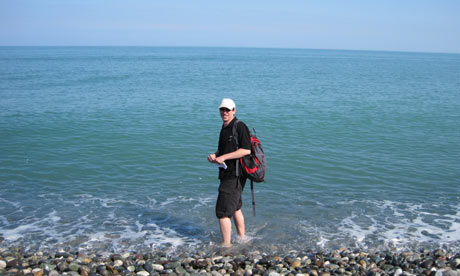
Georgia is smaller than Ireland, and it takes only around four hours for my driver, Roma, with his robustly assertive technique, to take us from the town of Gori, bang in the country's centre, to the semi-tropical south-west Black Sea coast near the Turkish border. (Meanwhile, I have a chance to listen to Roma's CD collection including Hey, Fatty! a catchy Russian-language cover version of MC Hammer's Can't Touch This.)
We hit the coast north of our destination, the port of Batumi, in the early evening, and drive through the warmth, with the sun hanging magically over the Black Sea to our right. The car weaves through the thickly forested hills and the city finally emerges below us. My first impression is of somewhere rather exotic. Four oil tankers sit, strangely forbidding, out to sea. Batumi is a booming, wealthy port thanks to trade links with Turkey, and even from afar it has a lively, cosmopolitan feel.
This is something that cannot, however, be said of our lodgings, the Sputnik hotel high on a hill overlooking the city. It's a huge Stalinist hangover with a cavernous, gloomy lobby holding oversized furniture, rooms that haven't been refurbished for decades, doors that don't close properly, and water that takes about half an hour to heat up. Essentially, it's a 1970s Soviet-era- themed hotel - and I instantly fall in love with it.
We breakfast (alone, like the vast majority of our meals in restaurants) with loud pop music playing. At 9am the sun is up, and it is already hot. Risking ridicule by wearing shorts - Georgians think blokes in shorts look hilarious - I venture down to the stony seashore to fulfil a long-cherished ambition of paddling in the fabled Black Sea. That duly achieved, we walk along one of Batumi's new attractions: a long, green leafy park packed with exotic plants running along the seashore. A football comes soaring out of a fenced-off football pitch. I pick it up and hurl it back.
"Who's your favourite English footballer," I ask them.
"Rooney!"
"Not Beckham?" I suggest.
"No. don't like him."
As we walk, Nini explains: "Beckham looks too much like a girl; Rooney looks like a bull. Georgian men like that."
The more I see of Batumi, the more I like it; there's an energy and self-confidence here that was somehow lacking in Tbilisi. There are loads of sea-front restaurants and hotels catering for the seaside trade, and a new ultra-modern-looking opera house is being built. After our walk, we drive up into the hills behind the city and wander through the lush, century-old botanical gardens standing on sheer cliffs over the sea, with sweeping views of the city, before head back down towards the seafront.
Batumi, until a couple of years ago, boasted a gigantic white "chess palace" on the seafront, which, in the true Soviet tradition, hosted huge domestic and international tournaments. Sadly, it's now boarded up, awaiting refurbishment as a hotel. But a new, similarly impressive, venue is promised and for the time being players congregate in a pleasant pavilion near the seafront.
At midday, there are already half-a-dozen games in progress and I challenge local student - and two-time Baku University chess champion - Mukhran, to a match. But with such mismatched talents, Walker versus Abashidze (Butami, 2009), was never going to be a classic, and my overly cautious opening allows Mukhran to develop a potentially devastating kingside attack. Before he can deliver the coup-de-grace, however, I conveniently decide it's time for lunch.
Outside, I ask Mukhran if chess has declined in popularity after the collapse of the Soviet Union. "No, chess is the king of games. If anything, it's more popular," he says.
Over lunch, (a chance to try the city's famous cheese pies, khachapuri), Sophia, a local tourist guide, says that the city's air of self-confidence is no illusion. Turks and Azerbaijanis come to play in casinos, forbidden in their own countries. But, between 2004 and 2008, only 2,485 Brits visited the region; and since the war, the tourist trade here, like everywhere, has taken a serious hit.
We drive though some nearby villages in the evening. I'm intrigued by one thing that I've heard: that older people still look back on Soviet times as a golden age. I meet two of them, Tariel, 54, and Avto, 80 in one town square.
"It was better in Soviet times," says Avto, a member of the Stalber school of political philosophy. "I have 10 kids. One of my daughters works in the local water plant. In the old days, she got 80 roubles a month. Now she gets 12 lari (roughly £4) - except she hasn't been paid for eight years."
Tariel feels differently. "Since the Rose Revolution [in 2003], the amenities have been good: the water, the roads. These problems have been solved." He does, he admits, spend a lot of time ferrying pregnant women to hospital because the government won't licence the decrepit local hospital building. But, clearly the optimist, he concedes: "The hospital is bad; maybe the government will pay for its renovation."
• Tomorrow: Maxton visits the Borjomi-Kharagauli national park.
• Maxton Walker flew with bmi from London Heathrow to Tbilisi, Georgia. Return flights are from £430. In Batumi, he stayed at Hotel Sputnik, where double rooms start from 70 lari (£26.50) a night

